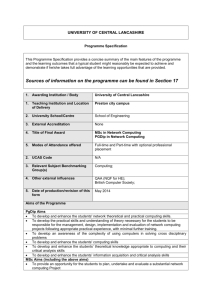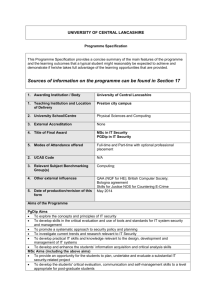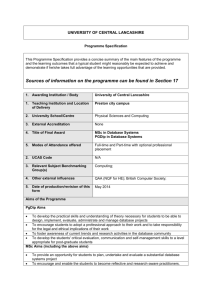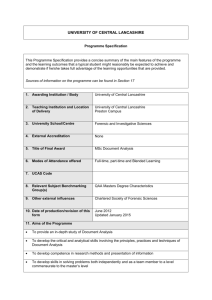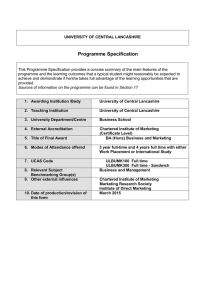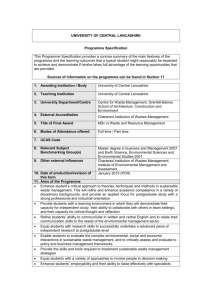BA (Hons) Accounting and Business (Sept 2013)
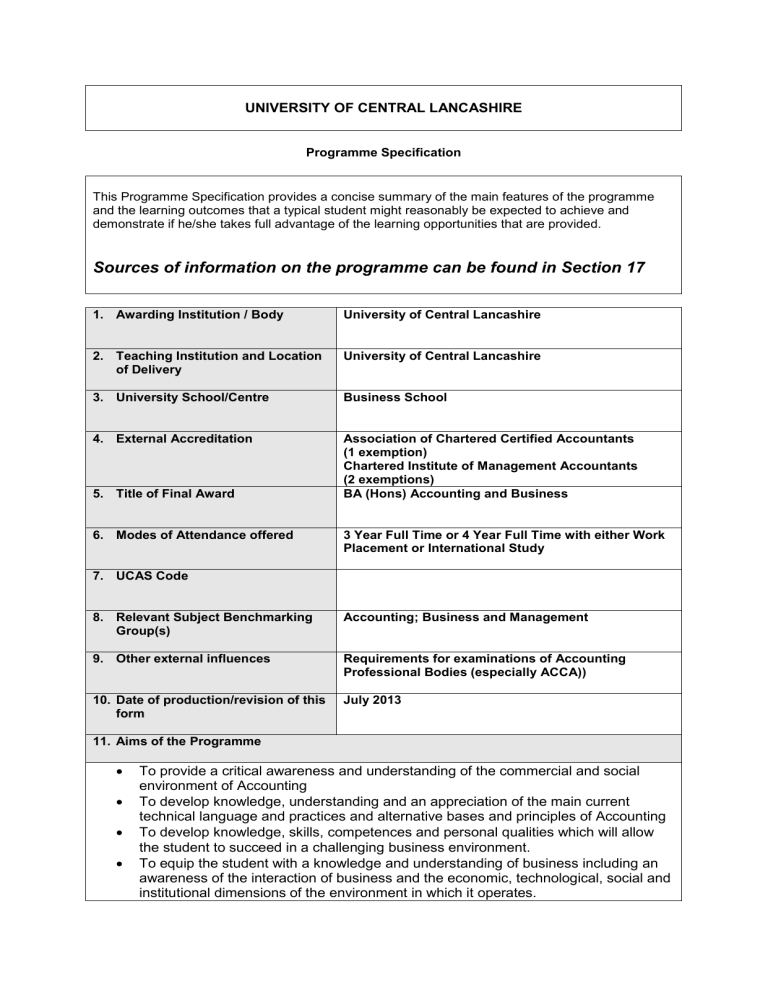
UNIVERSITY OF CENTRAL LANCASHIRE
Programme Specification
This Programme Specification provides a concise summary of the main features of the programme and the learning outcomes that a typical student might reasonably be expected to achieve and demonstrate if he/she takes full advantage of the learning opportunities that are provided.
Sources of information on the programme can be found in Section 17
1. Awarding Institution / Body
2. Teaching Institution and Location of Delivery
3. University School/Centre
4. External Accreditation
University of Central Lancashire
University of Central Lancashire
Business School
5. Title of Final Award
6. Modes of Attendance offered
7. UCAS Code
8. Relevant Subject Benchmarking
Group(s)
9. Other external influences
10. Date of production/revision of this form
Association of Chartered Certified Accountants
(1 exemption)
Chartered Institute of Management Accountants
(2 exemptions)
BA (Hons) Accounting and Business
3 Year Full Time or 4 Year Full Time with either Work
Placement or International Study
Accounting; Business and Management
Requirements for examinations of Accounting
Professional Bodies (especially ACCA))
July 2013
11. Aims of the Programme
To provide a critical awareness and understanding of the commercial and social environment of Accounting
To develop knowledge, understanding and an appreciation of the main current technical language and practices and alternative bases and principles of Accounting
To develop knowledge, skills, competences and personal qualities which will allow the student to succeed in a challenging business environment.
To equip the student with a knowledge and understanding of business including an awareness of the interaction of business and the economic, technological, social and institutional dimensions of the environment in which it operates.
To develop the following non subject-specific skills: numeracy skills, use of information technology, extraction of data, drawing conclusions from case study information, oral and written reporting.
Work Placement Route Course Aim – to offer students an opportunity to undertake a placement year constituting an introduction to business practice through practical training and development and to integrate their academic studies with such experience
International Study Route Course Aim – to offer students an opportunity to study abroad, demonstrate initiative, independence and motivation. They may also be required to develop a working knowledge of another language.
12. Learning Outcomes, Teaching, Learning and Assessment Methods
A. Knowledge and Understanding
A knowledge and understanding of:
A1. The commercial and social environment of Accounting and alternative bases and principles of advanced Accounting
A2. Current technical language and practices of advanced Accounting, finance and related business subjects
A3. The economic, financial, environmental, ethical, legal, political and sociological contexts of business activity
A4. Business problems and the variety of approaches to resolving them
Teaching and Learning Methods
Acquisition of knowledge and understanding (A1-A4) is by lectures, seminar work and workshops (A1, A2).
Assessment methods
Outcomes A1-A4 are assessed by a variety of methods, including examinations, coursework tests, essays, problem solving exercise (A1,A2) and presentations. In most Accounting modules the technical nature of the subject, and the requirements of the relevant Accounting professional bodies regarding exemptions, leads to a major proportion of the assessment weighting being allocated to assessment by examination – usually 70%.
B. Subject-specific skills
An ability to :
B1. Prepare statement of financial performance, statement of financial position, statements of cash flow and internal management accounting information such as budgets and costing
B2. Use information technology to prepare, analyse, interpret and evaluate accounting information and business data
B3. Frame business problems in an appropriate economic, ethical, environmental and political context
B4. Communicate business ideas in a clear and cogent manner and apply appropriate business theories, models and methods
Teaching and Learning Methods
Teaching and learning is mostly by lectures followed by seminar work involving case studies or discussion of theoretical concepts. Learning outcomes are also assessed by a variety of methods, including examinations, coursework tests, essays and presentations. Where appropriate, computer-based seminars are used.
Assessment methods
For outcomes B1-B4 the assessment methods described in Part A are used.
C. Thinking Skills
An ability to:
C1. Analyse, interpret and critically evaluate accounting and business information; theoretical accounting and business concepts and issues.
C2. Apply different approaches to different experiences and situations and to reflect and learn from those experiences.
C3. Strategic thinking. Learning the importance of the roles of opportunities, strategies, outcomes, information and motivation in the analysis of strategic actions, including conflict, bargaining and negotiation.
Teaching and Learning Methods
Teaching and learning is achieved through lectures, case study seminar work, group seminar discussions and course work, if appropriate.
Outcome C2, The opportunities provided to work in business (work placement route) and study abroad (international study option) can serve to widen and enhance the student experience. A broad experience provides the foundation for developing higher level critical thinking skills.
Assessment methods
For outcome C1-C3 the assessment methods described in Part A are used.
Outcome C2-C3 is also achieved through the work placement opportunity available to students.
D. Other skills relevant to employability and personal development
An ability to:
D1. Communicate effectively in writing
D2. Extract and collate information
D3. Engage in independent self-motivated study and working
D4. Manage personal development
D5. Work effectively within a team
Teaching and Learning Methods
Outcomes D1-D2 are covered in Parts A-C;D3-D4 are monitored by individual review of completed work prior to seminars, and by periodic in-semester tests, where appropriate.
D1-D5 can be achieved through the common core of personal and professional development modules studied throughout the programme seek to enhance the students’ employability, initiative and focus on life choices post- University
Assessment methods
The outcomes (D1-D2) are assessed by coursework and examination.
Acquisition of skills relevant for employability and personal development (D3-D5) is through the variety of teaching methods and through the experience gained from the work placement.
13. Programme Structures*
Level Module
Code
Module Title
Level 6 AC3100
AC3200
BU3413
BU3016
BC3010
AC3300
AC3400
AC3600
AC3650
AC3908
BC3001
HR3024
BU3207
CD3114
BC3000
BC3008
Advanced Financial Accounting
Advanced Management
Accounting
Business Strategy
Contemporary Issues in
Business
Dissertation
Plus ONE of the following options
Auditing Theory and Practice
Corporate Finance
Taxation Theory and Practice
Risk and Capital Markets
International Financial
Environment
Continuing Professional
Development
Evaluating HRM
International Management
Start a Business
Or ONE option available within the School that the Course
Leader deems appropriate for the programme of study. Further such options must be agreed upon by the External Examiner
Work Placement
International Study
Credit rating
20
20
20
20
20
20
20
20
20
20
20
120
120
20
20
20
14. Awards and Credits*
Bachelor Honours
Degree BA Hons in
Accounting and
Business
Requires 360 credits including a minimum of
220 at Level 5 or above and 100 at Level 6
Work placement route requires successful completion of BC3000 which has a notional credit rating of 120 credits.
International study route requires successful completion of
BC3008 which has a notional credit rating of
120 credits
Bachelor Degree BA in
Accounting and
Business
Requires 320 credits including a minimum of
180 at Level 5 or above and 60 at Level 6
Work placement route requires successful completion of BC3000 which has a notional credit rating of 120 credits.
International study route requires successful completion of
BC3008 which has a notional credit rating of
120 credits
Level 5 AC2100
AC2200
BC2000
Or
CD2001
EC2102
MG2008
AC2410
AC2000
AC2500
AC2650
AC2906
EC2401
EC2006
HR2050
Financial Accounting
Management Accounting
Transition to Work (for students aiming to gain a placement)
Planning Your Career (for students on the 3 year route)
The Global Environment of
Business
Project and Operations
Management
Plus ONE of the following options
Finance for Managers
Enterprise Operations for
Financial Managers
Accounting Information Systems and Control Issues
Introduction to Financial
Services Markets
International Financial
Management Techniques
Business Economics
Economics and Business in the
European Union
Managing Personnel and
Human Resources
Or ONE option available within the School that the Course
Leader deems appropriate for the programme of study. Further such options must be agreed upon by the External Examiner
20
20
20
20
20
20
20
20
20
20
20
20
20
20
Diploma of Higher
Education in
Accounting and
Business
Requires 240 credits including a minimum of
100 at Level 5 or above
Level 4 AC1100
AC1200
AC1300
BC1000
EC1401
BU1005
Introduction to Financial
Accounting
Introduction to Management
Accounting
Information Systems and the
Business Environment
Introduction to Personal and
Professional Practice
Introduction to Business
Economics and Finance
Business Relationships
20
20
20
20
20
20
Certificate of Higher
Education in
Accounting and
Business
Requires 120 credits at
Level 4 or above
15. Personal Development Planning
The students’ ability to reflect upon their skills base and plan for future personal development is developed, practiced, monitored and assessed throughout the programme and there is a strong focus on developing the individual’s employability and lifelong learning skills.
Personal Development Planning exists as a formal strand in years 1, 2, and 3/4. These modules are designed to equip students with the ability to enhance personal, academic and professional skills and plan for their future career development.
16. Admissions criteria
Programme Specifications include minimum entry requirements, including academic qualifications, together with appropriate experience and skills required for entry to study.
These criteria may be expressed as a range rather than a specific grade. Amendments to entry requirements may have been made after these documents were published and you should consult the University’s website for the most up to date information.
Students will be informed of their personal minimum entry criteria in their offer letter.
The University’s minimum standard entry requirements for degree level study is a 12 unit profile, made up from one of the following:
At least two A2 level subjects including
One A2 level subject plus one single award Advanced VCE
One double or two single award(s) Advanced VCE
Other acceptable qualifications include:
Scottish Certificate of Education Higher Grade
Irish Leaving Certificate Higher Grade
International Baccalaureate
BTEC National Certificate/Diploma
Kite marked Access Course
Applications from individuals with non-standard qualifications, relevant work or life experience and who can demonstrate the ability to cope with and benefit from degree-level studies are welcome and will these applicants will be interviewed. If applicants have not studied recently they may need to undertake an Access programme first.
17. Key sources of information about the programme
Prospectus http://www.uclan.ac.uk/information/courses/prospectus.php
University Admissions Department: http://www.uclan.ac.uk/information/services/sss/admissions/admissions_apply.php
Advice about applications: http://www.uclan.ac.uk/information/services/sss/admissions/admissions_contact.php
Open Days and Campus Tours:
http://www.uclan.ac.uk/study/open_days/try_an_applicant_day.php
Programme/Course Leader: Mohamed Parker, GR038, Ext.4672, MSParker@uclan.ac.uk
Information about UCLan www.uclan.ac.uk
Information about the city of Preston http://www.uclan.ac.uk/study/up_north/up_north.php
Information about student life at UCLan http://www.uclan.ac.uk/students/student_life.php
Level
Module
Code Module Title
Core (C) or
Compulsory
(comp) or
Option (O)
AC3100 Advanced Financial Accounting (Comp)
AC3200 Advanced Management Accounting (Comp)
BU3413 Business Strategy (Comp)
BU3016 Contemporary Issues in Business (Comp)
BC3010 Dissertation
BC3000 Work Placement
(Comp)
(O)
Knowledge and understanding Subject-specific Skills Thinking Skills
Other skills relevant to employability and personal development
*
*
*
A1 A2 A3 A4 B1 B2 B3 B4 C1 C2 C3 D1 D2 D3 D4 D5
* * * * * * * * *
* * * * * * * *
* * * * * * * * * *
*
* * * * * * *
*
* * * * * *
* * *
*
* * * * * *
BC3008 International Study
AC2100 Financial Accounting
(O)
(Comp)
AC2200 Management Accounting (Comp)
EC2102 The Global Environment of Business (Comp)
MG2008 Project and Operations Management (Comp)
BC2000 Transition to Work (Comp)
*
*
*
*
*
*
*
*
*
*
*
*
* *
*
*
*
*
*
*
*
*
*
*
*
*
*
*
*
*
*
*
CD2001 Planning Your Career (Comp)
AC1100 Introduction to Financial Accounting (Comp)
AC1200
Introduction to Management
Accounting (Comp)
BC1000
AC1300
EC1401
Introduction to Personal and
Professional Practice
Information Systems & the Business
Environment
Introduction to Business Economics and Finance
(Comp)
(Comp))
(Comp)
*
*
*
*
*
*
*
*
*
* *
*
*
*
*
*
*
*
*
*
*
*
*
*
*
*
*
*
*
*
* * * * * * * *
BU1005 Business Relationships (Comp) * * * * * * * * *
Note: Mapping to other external frameworks, e.g. professional/statutory bodies, will be included within Student Course Handbooks
*
*
*
*
*
*
*
*
*
*
*
*
*
*
*
*
*
*
*
*
*
*
*
*
*
*
*
*
*
*
*
*
*
*
*
*
*
*
*
*
